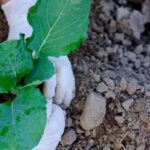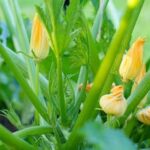Composted leaves and grass can be incredibly beneficial for vegetable gardens, as they provide essential nutrients and improve soil health. Compost, in general, is a rich and natural fertilizer that enriches the soil with organic matter. When it comes to vegetable gardens, using composted leaves and grass offers numerous advantages.
Organic fertilizers are increasingly important for gardeners who prioritize sustainability and chemical-free growing practices. In this article, we will explore the process of composting leaves and grass, the nutrient content of the resulting compost, its impact on soil health, best practices for application, environmental benefits, potential drawbacks, and success stories from gardeners who have experienced its positive effects.
Composting involves the decomposition of organic materials such as leaves and grass into a nutrient-rich soil amendment called compost. This natural process results in a product that is filled with beneficial microorganisms and essential nutrients that support plant growth. By utilizing compost in vegetable gardens, gardeners can improve soil structure, enhance water retention, encourage beneficial microbial activity, and ultimately foster healthy plant growth.
Organic fertilizers like composted leaves and grass offer a sustainable alternative to synthetic fertilizers by providing essential nutrients without harmful chemical additives. As an environmentally friendly option that also reduces waste by utilizing yard trimmings for composting material, it’s becoming increasingly popular among gardeners. In the following sections of this article, we’ll delve deeper into the specific benefits of using composted leaves and grass as fertilizer for vegetable gardens.
Composting Leaves and Grass
How to Properly Compost Leaves and Grass
Composting leaves and grass is a relatively simple process that involves layering these organic materials with other nitrogen-rich ingredients such as kitchen scraps or manure. It’s important to maintain the right balance of green (nitrogen) and brown (carbon) materials in order to facilitate decomposition. Turning the compost regularly helps aerate the pile and speed up the breakdown process. In a matter of months, the pile will transform into dark, crumbly compost ready for use in the garden.
The Process of Decomposition
As leaves and grass decompose, they release nutrients such as nitrogen, phosphorus, potassium, and various micronutrients into the compost. This transformation occurs through the work of microorganisms such as bacteria, fungi, and earthworms which break down the organic matter into a form that plants can readily absorb.
Ideal Composting Conditions for Leaves and Grass
A successful composting process depends on ideal conditions such as proper moisture levels, adequate air circulation, and a suitable temperature range. The ideal temperature for decomposition falls between 135-160 degrees Fahrenheit (57-71 degrees Celsius). Gardeners should monitor these factors closely to ensure that the compost reaches its full potential before being used in vegetable gardens.
Nutrient Content
Nutrients Found in Composted Leaves and Grass
Composted leaves and grass are rich in nutrients that are beneficial for vegetable gardens. As these organic materials decompose, they release essential elements such as nitrogen, phosphorus, potassium, and micronutrients like calcium, magnesium, and sulfur. These nutrients are vital for the healthy growth of plants and play a significant role in enhancing the flavor and nutritional value of vegetables. Additionally, the slow release of nutrients from compost ensures a steady supply for plant uptake, reducing the risk of nutrient leaching.
How These Nutrients Benefit Vegetable Gardens
The nutrient content in composted leaves and grass contributes to overall soil fertility, promoting strong root development and improving plant resilience against diseases and environmental stressors. Nitrogen supports leafy growth, phosphorus aids in flowering and fruit development, while potassium enhances the plant’s ability to resist drought and disease. The micronutrients found in compost also play crucial roles in various physiological processes within plants, ensuring optimal health and productivity.
Comparing Nutrient Content to Other Fertilizers
Composted leaves and grass offer a well-balanced array of nutrients that can rival synthetic fertilizers. When compared to chemical fertilizers, compost provides a more diverse range of nutrients that are made available gradually over time.
In contrast, synthetic fertilizers may supply an immediate surge of specific nutrients but can lead to nutrient imbalances or even harm beneficial soil organisms if overused. Overall, incorporating composted leaves and grass into vegetable gardens can provide a sustainable source of essential nutrients while promoting soil health and long-term fertility.
Soil Health
Using composted leaves and grass in vegetable gardens not only provides necessary nutrients for plants, but it also significantly contributes to the overall health of the soil. The organic matter present in compost helps to improve soil structure by increasing its ability to retain moisture, improving aeration and drainage, and promoting root growth. This is especially beneficial for vegetable gardens, as healthy soil leads to healthier and more productive plants.
Additionally, by incorporating compost into the soil, gardeners can reduce their reliance on chemical fertilizers. This is important for maintaining long-term soil health, as excessive use of synthetic fertilizers can lead to nutrient imbalances and degrade the natural properties of the soil. Compost acts as a natural alternative that not only enriches the soil with essential nutrients but also helps to maintain its delicate balance, creating an environment that is conducive to plant growth.
Moreover, utilizing composted leaves and grass encourages the presence of beneficial microorganisms in the soil. These microorganisms play a crucial role in breaking down organic matter, releasing nutrients for plant absorption, and warding off harmful pathogens.
As a result, the overall ecosystem within the soil becomes more diverse and balanced, further contributing to the health and vitality of vegetable gardens. Overall, by using composted leaves and grass in vegetable gardens, gardeners can foster an environment that supports thriving plants while simultaneously enhancing the long-term health of their soils.
Application
When it comes to using composted leaves and grass as fertilizer for vegetable gardens, proper application is key to ensuring optimal results. Here are some best practices for using compost in your vegetable garden:
– **Incorporating compost into the soil:** Before planting your vegetables, mix the composted leaves and grass into the soil to ensure that the nutrients are evenly distributed. This can be done by tilling or digging the compost into the top layer of the soil.
– **Avoiding over-application:** While compost is beneficial for the soil, too much of it can actually have detrimental effects. Over-application of compost can lead to nutrient imbalances, excessive microbial activity, and poor water retention in the soil.
– **Potential issues to avoid:** When applying compost, it’s important to mitigate any potential issues that may arise. This includes making sure that the compost has fully decomposed to prevent the introduction of weed seeds or pathogens into your vegetable garden.
Composted leaves and grass have a positive impact on vegetable gardens due to their ability to provide essential nutrients, improve soil structure, and reduce the need for chemical fertilizers. By following these guidelines for application, you can make the most out of using compost in your own vegetable garden.
Environmental Impact
Composting leaves and grass can have a significant positive environmental impact, especially when used as fertilizer in vegetable gardens. One of the main benefits is the reduction of waste.
Instead of sending organic matter to landfills where it would contribute to greenhouse gas emissions, composting these materials allows them to be repurposed as a valuable resource for gardening. In fact, according to the Environmental Protection Agency (EPA), yard trimmings and food residuals together constitute 27% of the United States’ municipal solid waste, making composting an important strategy for waste reduction.
In addition to reducing waste, using composted leaves and grass as fertilizer offers an environmentally friendly alternative to synthetic fertilizers. Unlike chemical fertilizers, which are manufactured through energy-intensive processes and can leach harmful substances into the environment, compost enriches the soil naturally.
When applied to vegetable gardens, compost helps promote healthy plant growth while minimizing the negative impact on surrounding ecosystems. As a result, utilizing composted leaves and grass in gardening practices contributes to biodiversity conservation and sustainable land management.
Moreover, incorporating organic fertilizers like compost into vegetable gardens can help minimize carbon footprints. By encouraging the recycling of natural materials such as leaves and grass, gardeners are actively participating in carbon sequestration efforts.
This means that instead of releasing carbon dioxide into the atmosphere through decomposition or incineration, these organic materials are being utilized to enrich soil health and support plant growth. As a result, individuals who use composted leaves and grass can play a role in mitigating climate change while cultivating their own food in environmentally responsible ways.
| Environmental Impact Benefits | Environmental Impact Measures |
|---|---|
| Reduction of waste | Recycling yard trimmings and food residuals |
| Sustainable land management | Promoting biodiversity conservation |
| Carbon footprint minimization | Incorporating recycled natural materials into soil health measures |
Potential Drawbacks
When considering the use of composted leaves and grass as fertilizer for vegetable gardens, it is important to be aware of potential drawbacks or concerns that may arise. One common misconception is the presence of weed seeds in compost, which can lead to unwanted plant growth in the garden. Additionally, there may be concerns about pathogens present in the compost that could potentially harm the vegetable plants.
To address these issues, it is important to ensure that the composting process reaches appropriate temperatures to kill weed seeds and pathogens. This can be achieved by regularly turning the compost pile and monitoring its internal temperature. Additionally, using a well-balanced mix of materials in the compost pile, including leaves, grass clippings, and other organic matter, can help promote proper decomposition and minimize any potential issues.
Another potential drawback to consider is the possibility of over-application of compost in the garden. While compost provides valuable nutrients to the soil, excessive amounts can lead to an imbalance in nutrient levels or even create an overly rich environment for plant growth. It is important to follow recommended guidelines for incorporating compost into the soil and avoid using more than necessary for optimal plant health.
Success Stories
Composted leaves and grass have been proven to be excellent sources of organic fertilizer for vegetable gardens, and there are numerous success stories that showcase the benefits of using this natural compost. One such success story comes from a community garden in a suburban neighborhood, where the soil quality was initially poor due to construction in the area.
After incorporating composted leaves and grass into the soil for several months, the garden saw a significant improvement in plant growth and crop yield.
Another success story comes from a small-scale organic farm that exclusively uses composted leaves and grass as their primary source of fertilizer. Not only have they witnessed an increase in the overall health of their vegetables, but they have also noticed a decrease in pest infestations, which they attribute to the improved soil health brought about by the regular application of compost.
Furthermore, personal testimonials from individual gardeners have highlighted how composted leaves and grass have transformed their vegetable gardens. From enhanced flavor in their produce to vibrant and robust plants, these success stories serve as tangible evidence of the positive impact that this natural fertilizer can have on vegetable gardens.
| Success Story | Impact |
|---|---|
| Community Garden | Improved plant growth and crop yield |
| Organic Farm | Decrease in pest infestations, improved soil health |
| Individual Gardeners | Enhanced flavor in produce, vibrant and robust plants |
Conclusion
In conclusion, it is evident that composted leaves and grass can be an excellent fertilizer for vegetable gardens. The process of composting these organic materials not only benefits the environment by reducing waste but also provides nutrient-rich soil amendments for growing healthy and productive plants. By utilizing compost in vegetable gardens, gardeners can improve soil health, encourage beneficial microorganisms, and reduce the need for chemical fertilizers.
Furthermore, the nutrient content in composted leaves and grass provides essential elements for vegetable growth, ultimately leading to higher yields and better-tasting produce. When compared to synthetic fertilizers, compost has a lower environmental impact and contributes to overall sustainability in gardening practices.
As evidenced by success stories and testimonials from experienced gardeners, using composted leaves and grass can significantly enhance the vitality of vegetable gardens. Therefore, it is highly recommended that readers consider incorporating organic fertilizers into their own gardening routine. By doing so, they can enjoy improved soil structure, healthier plants, and contribute to a more eco-friendly approach to gardening. Overall, composted leaves and grass serve as a valuable resource for promoting the health and productivity of vegetable gardens.
Frequently Asked Questions
Is It Good to Put Grass Clippings in Your Vegetable Garden?
It can be good to put grass clippings in your vegetable garden, as long as you do so carefully. Grass clippings can provide valuable nutrients to the soil and help with moisture retention. However, it’s important to avoid using grass clippings that have been treated with herbicides or pesticides, as these chemicals can harm your vegetables.
Is Leaf Compost Good for Vegetable Garden?
Leaf compost can be very beneficial for a vegetable garden. When properly composted, leaves can add essential organic matter to the soil, improve its texture, and enhance its ability to retain moisture and nutrients. Additionally, leaf compost can help suppress weeds and reduce the need for synthetic fertilizers.
Are Grass and Leaves Good for Garden?
Both grass and leaves can be good for a garden when used appropriately. Grass clippings and leaves can break down into organic matter that enriches the soil and enhances its overall health.
However, it is important to use them wisely – avoid using grass or leaves that have been chemically treated, and ensure that they are properly composted before adding them to your garden beds. This will help ensure that they contribute positively to your garden’s ecosystem without causing any harm.

If you’re looking to get into vegetable gardening, or are just looking for some tips on how to make your current garden better, then you’ve come to the right place! My name is Ethel and I have been gardening for years. In this blog, I’m going to share with you some of my best tips on how to create a successful vegetable garden.





